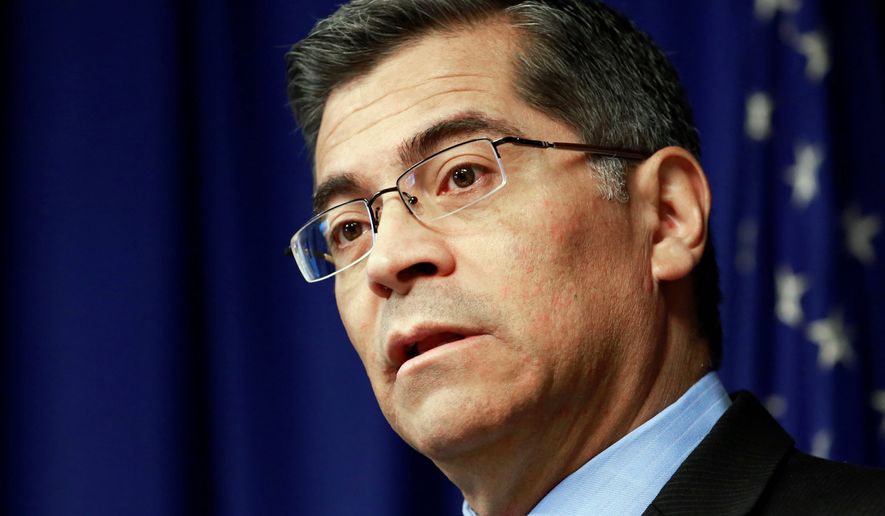Immigrant rights groups accused the Trump administration of a racist plot against American democracy Tuesday after the Commerce Department said it would ask Americans to disclose their citizenship status on the 2020 census.
President Trump’s defenders countered that the groups, and the Democratic Party, are afraid they’ll lose political power once Americans realize how much political power rests in areas where noncitizens overwhelm citizens.
“Using citizenship data will be a political wipeout for the left across the country at every level,” said J. Christian Adams, president of the Public Interest Legal Foundation.
The feud is already in court, after California Attorney General Xavier Becerra had filed the first lawsuit just hours after the decision.
Mr. Becerra argues illegal immigrants and others will be scared away from responding to the census, leaving them uncounted — which he said will likely force California to lose a seat in Congress.
Anti-Trump activists, meanwhile, piled on criticism, saying the administration is less interested in data and more interested in chasing people away from participating in the decennial count.
“All people must reject this hostile and racist move by the Trump administration to push people of color away from the census,” said Cristina Jimenez, executive director at United We Dream, which advocates for illegal immigrant Dreamers. “This move is a blatant attempt to rig the books to benefit Republican politicians by undercounting immigrants.”
Democratic National Committee Chairman Tom Perez called the move “a craven attack on our democracy and a transparent attempt to intimidate immigrant communities.”
Commerce Secretary Wilbur L. Ross Jr. announced the decision late Monday, saying he was acceding to a request by the Justice Department, which said having a clearer picture of citizenship would help it enforce the Voting Rights Act better.
The full census did ask about citizenship from 1890 through 1950, and through 2000 the question was asked on the census “long form,” which went to about 1 in 6 households during the decennial count. The long form was discontinued after that, replaced by the rolling count of the American Community Survey, which also still asked about citizenship.
The Justice Department says that only gives broad estimates, which aren’t enough to make good decisions on cases.
Mr. Adams, a former voting rights lawyer at the Justice Department and now president of the PILF, said he can point to just those kinds of instances where lack of good data on the citizen voting-age population squelched cases.
“There are cases that were rejected at DOJ, in other words we aren’t going to go forward, because of this citizenship issue. In other words we can’t get data because the census doesn’t have good data,” he said.
Legal analysts said citizenship data can’t be used to dole out seats in Congress among the states. That’s been settled by the Supreme Court. But the court has left the door open to states and localities to look at citizenship when drawing the actual lines for legislative districts.
Mr. Adams said that could be eye-opening for a county like Los Angeles, where black residents in Los Angeles would realize how much power they’ve lost to Hispanics, based on how county legislative districts are drawn.
California’s lawsuit argues the Census Bureau hasn’t tested the new citizenship question, so it doesn’t know whether participation would tank. Mr. Becerra says it’s safe to assume it will drop.
The census’s own research last year said immigrants were already on edge based on the tenor of the ongoing immigration debate, and the bureau was worried about participation.
Given that the Constitution requires a decennial count, anything that interferes with those results is unconstitutional, Mr. Becerra argues. He also says Mr. Ross broke procedural laws by adding the question in so late in the process.
California could be breaking new legal ground.
Nate Persily, a professor at Stanford Law School, said he’s not aware of any cases where someone successfully challenged the Census Bureau’s decision-making on questions.
“But the issue here is whether this late, unprecedented, change will actually destroy the value of the census,” he said. “It is therefore not so different than the many other cases challenging census numbers.”
Mr. Persily also questioned the Justice Department’s assertion that it needs more specific data to be able to make decisions about voting cases.
“Absolutely no one who works on voting rights cases thinks you need to change the decennial census to enforce the Voting Rights Act,” he said.
Mr. Adams, though, said California was wasting taxpayers’ money with the lawsuit.
“They’re going to lose,” he said, adding, “the census can count however they want.”
• Stephen Dinan can be reached at sdinan@washingtontimes.com.




Please read our comment policy before commenting.